How to Obtain a Residence Permit in Switzerland for Retirees
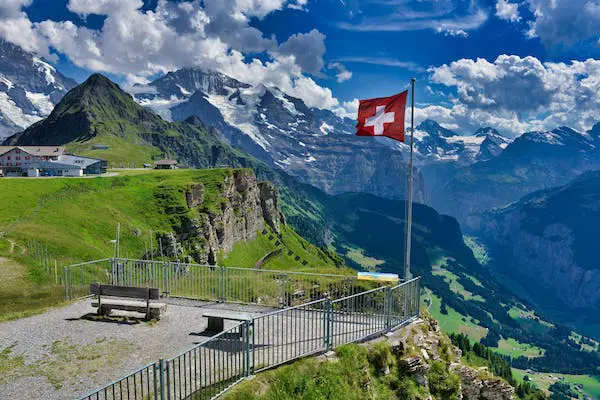
Switzerland is indeed a great place to retire and it's not just the natural beauty and cultural attractions that make it an attractive destination. The country is also known for its high standard of living, excellent healthcare system, and low crime rates.
Retirees who wish to live in Switzerland must prove that they have sufficient financial means to support themselves without relying on Swiss social security benefits. This typically requires having a regular income from a pension or other source, as well as proof of health insurance coverage.

In addition to the financial requirements, retirees must also meet certain criteria related to age, language proficiency, and integration into Swiss society. In order to obtain a Switzerland Residence Permit for Retirees, you must be at least 55 years of age and able to speak one of the country's national languages, either German, French, Italian or Romansh.
Overall, Switzerland offers a high quality of life and a safe, secure environment for retirees. If you are considering retiring in Switzerland, it's a good idea to do your research and carefully consider your financial situation and requirements before making a decision.
Residence Permit in Switzerland for Retirees
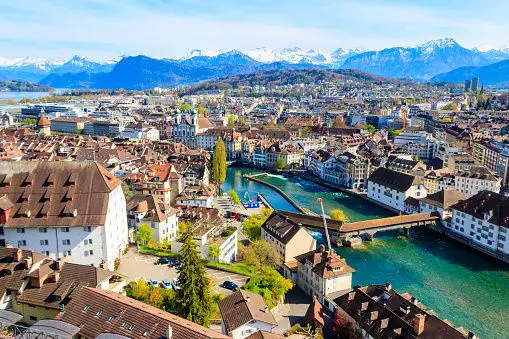
The specific requirements for obtaining a Swiss Residence Permit for Retirees can vary depending on your nationality and the canton in which you wish to reside. In general, foreign retirees are required to demonstrate their financial independence and provide evidence of health insurance coverage.
In terms of financial independence, most cantons require retirees to have a regular income that is sufficient to cover their living expenses without relying on Swiss social security benefits. The exact amount required varies depending on the canton, but it typically ranges from 2,500 to 4,500 Swiss Francs per month.
In terms of health insurance, retirees must have adequate coverage that meets Swiss standards. This can be obtained through a private health insurance policy or through a government-sponsored health insurance plan.

It's also important to note that the process of obtaining a Swiss Residence Permit for Retirees can take several months, so it's a good idea to start the process well in advance of your desired move date.
Overall, while the requirements for retiring in Switzerland can seem stringent, the country offers a high standard of living and a safe, secure environment for retirees.
If you are considering retiring in Switzerland, it's a good idea to research the specific requirements for your nationality and desired canton, and consult with a specialist if necessary.
In order to apply for a Swiss Residence Permit for Retirees, you must be over the age of 55 and not seeking employment. Evidence of financial independence, including proof of health insurance coverage, must be provided.
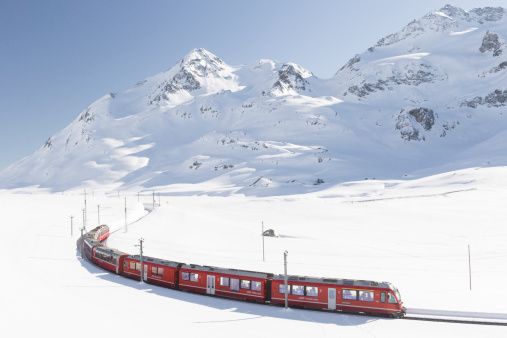
Additionally, a connection to Switzerland through family, property, company, or financial investment must be demonstrated.
Switzerland is divided into 26 cantons or regions, each with its own immigration policy. This means that approval for foreign residents must be granted by the relevant Swiss canton office.
However, due to bilateral agreements on freedom of movement, the process is relatively straightforward for citizens of the European Union (EU) or the European Free Trade Association (EFTA - Iceland, Liechtenstein, and Norway).
For example, citizens of the EU/EFTA are able to travel to Switzerland without a visa for a period of up to 90 days. However, if they plan to stay for a longer period, they must register with the relevant Swiss canton office and apply for a non-working residence permit within 14 days of their arrival.
Non-EU/EFTA Retiree Residence Permit Application Requirements
The requirements for a Non-EU/EFTA Retiree Residence Permit in Switzerland are similar to those for EU/EFTA retirees, with some additional requirements:
1. Age: You must be at least 55 years of age.
2. Employment: You cannot be seeking employment in Switzerland.
3. Financial Independence: You must demonstrate financial independence, typically by having a regular income from a pension or other source that is sufficient to support yourself without relying on Swiss social security benefits.
4. Health Insurance: You must have adequate health insurance coverage that meets Swiss standards. This can be obtained through a private health insurance policy or through a government-sponsored health insurance plan.
5. Connection to Switzerland: You must demonstrate a connection to Switzerland through family, property, company, or financial investment. This helps to demonstrate your commitment to living in Switzerland and your intention to integrate into Swiss society.
6. Application Process: Applications must be made through a Swiss consulate or embassy in your country of residence.
7. Other Requirements: Non-EU/EFTA retirees may also need to provide additional documentation and meet additional criteria, such as language proficiency or having a clean criminal record.
It's important to note that the requirements for a Non-EU/EFTA Retiree Residence Permit can vary depending on the canton in which you wish to reside, so it's a good idea to research the specific requirements for your situation and consult with a specialist if necessary.
Swiss Resident Permit For Retirees Duration

The duration of a Swiss Resident Permit for Retirees depends on your nationality and the canton in which you reside.
For EU/EFTA nationals, a Swiss Resident Permit for Retirees is generally issued for an indefinite period, as long as you continue to meet the eligibility criteria and comply with the conditions of your permit.
For Non-EU/EFTA nationals, the duration of a Swiss Resident Permit for Retirees may vary, but it is typically issued for a period of five years. After this period, you may apply for a renewal of your permit, provided you continue to meet the eligibility criteria and comply with the conditions of your permit.
In some cases, a Non-EU/EFTA national's Swiss Resident Permit for Retirees may be limited to a shorter period, for example, if you are considered to be a temporary resident. In this case, you may need to reapply for a new permit after the expiry of your current permit.
It is important to note that the conditions and duration of a Swiss Resident Permit for Retirees may change over time, so it's a good idea to regularly check the most up-to-date information and consult with a specialist if necessary.
Are dependents allowed for a Swiss Resident Permit for Retirees?

Dependents are generally allowed for a Swiss Resident Permit for Retirees. This typically includes a spouse or registered partner, as well as any underage children. In some cases, adult children who are financially dependent on the retiree may also be allowed to accompany them.
To apply for a Swiss Resident Permit for Retirees with dependents, you will need to provide evidence of your financial independence and accident and health insurance, as well as proof of your family relationship.

You may also need to provide additional documentation, such as proof of accommodation in Switzerland, and demonstrate that you have enough resources to support your dependents.
It is important to note that the conditions for dependents may vary depending on your nationality and the Swiss canton where you reside. It is recommended that you consult with a specialist or the appropriate Swiss canton office for the most up-to-date information and guidance.
Can a Swiss Resident Permit for Retirees lead to permanent residency in Switzerland?
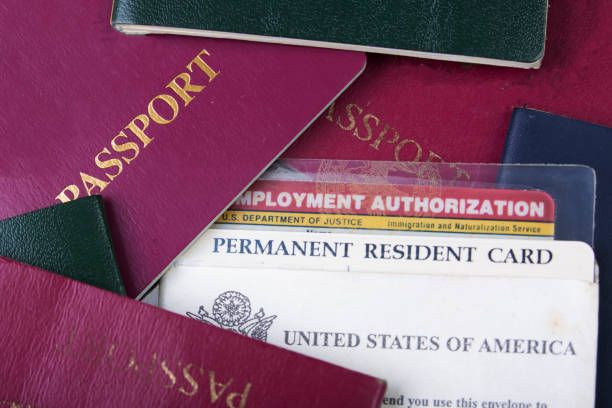
In general, a Swiss Resident Permit for Retirees is initially issued for a limited period and must be renewed periodically. However, in some cases, it may be possible to convert a Swiss Resident Permit for Retirees into permanent residency after a certain period of time. The conditions for obtaining permanent residency in Switzerland vary depending on your nationality and the Swiss canton where you reside.
In general, permanent residency may be granted to foreigners who have lived in Switzerland for a minimum of 10 years, have a clean criminal record, and have contributed to Swiss society by paying taxes and contributing to the local economy. Additionally, you must demonstrate that you have a stable and sufficient income, and adequate health insurance.
It is important to note that the conditions for obtaining permanent residency in Switzerland are subject to change, and the specific requirements can vary from canton to canton. It is recommended that you consult with a specialist or the appropriate Swiss canton office for the most up-to-date information and guidance.
Advantages of retiring in Switzerland
Switzerland is widely regarded as one of the best places in the world to retire due to its high standard of living, excellent healthcare system, and strong sense of security and stability. Some of the key reasons why people choose to retire in Switzerland include:
1. High Quality of Life: Switzerland is known for its clean, safe, and well-organized cities, picturesque countryside, and natural beauty. With a low crime rate, a strong infrastructure, and excellent public transportation, Switzerland provides a high quality of life for retirees.
2. Healthcare: Switzerland is renowned for its world-class healthcare system, which provides access to high-quality medical treatment, modern facilities, and experienced medical professionals.
3. Strong Economy: Switzerland has a strong and stable economy, which provides retirees with financial security and peace of mind. With low unemployment, a well-functioning social security system, and a high standard of living, Switzerland is a safe and attractive place to retire.
4. Multicultural Society: Switzerland is home to a diverse and multicultural society, with a mix of different languages, cultures, and religions. Retirees from all over the world are welcomed in Switzerland, making it an ideal place for people from all walks of life.
5. Outdoor Activities: With its alpine mountains, scenic lakes, and picturesque countryside, Switzerland is a paradise for outdoor enthusiasts. Retirees can enjoy hiking, skiing, snowboarding, and many other outdoor activities in the breathtaking Swiss Alps.
In summary, Switzerland offers a high quality of life, excellent healthcare, a strong economy, a multicultural society, and a host of outdoor activities for retirees. Whether you are looking for a peaceful, secure, and relaxing place to retire or an active lifestyle surrounded by natural beauty, Switzerland has something to offer everyone.
Best Retirement Locations in Switzerland
There are many great places to retire in Switzerland, and the best one for you will depend on your personal preferences, lifestyle, and budget. Some popular choices among retirees include:
1. Lake Geneva region
2. Zurich
3. The Swiss Alps
4. Ticino
5. Lucerne
These are just a few of the many great places to retire in Switzerland. Ultimately, the best location for you will depend on your personal preferences, lifestyle, and budget.
1. Lake Geneva region
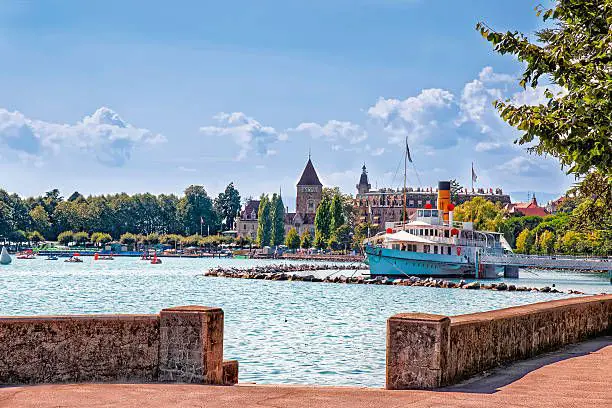
The Lake Geneva region in Switzerland is a popular location for retirees due to its high standard of living, excellent transport links, and rich cultural scene. This area is located in the western part of Switzerland, surrounding Lake Geneva, and encompasses the cantons of Geneva, Vaud, and Valais.
Retirees in this region can enjoy stunning lake views, as well as access to a variety of cultural attractions, including museums, theaters, and festivals. There are also many opportunities for outdoor activities, such as hiking, skiing, and water sports, in the nearby Swiss Alps.
In terms of healthcare, the Lake Geneva region is known for its excellent medical facilities and highly trained medical professionals. Additionally, the cost of living in this region is relatively high, but many retirees find it to be worth it for the high standard of living and quality of life.
Overall, the Lake Geneva region offers a desirable combination of natural beauty, cultural offerings, and modern amenities, making it a popular choice for retirees.
2. Zurich
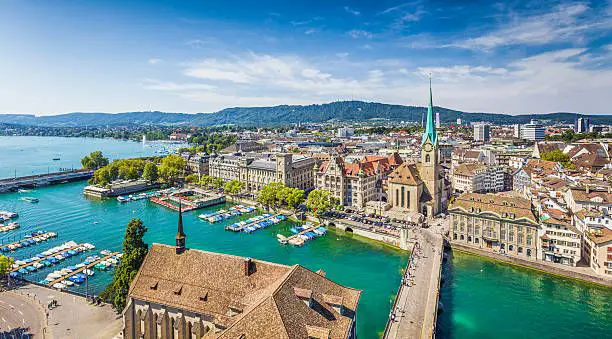
Zurich is the largest city in Switzerland and is a popular location for retirees due to its high standard of living, excellent healthcare, and rich cultural scene. It is located in the north-central part of the country and is surrounded by stunning Alpine scenery.
Retirees in Zurich can enjoy access to a variety of cultural attractions, including museums, theaters, and festivals. There are also many opportunities for outdoor activities, such as hiking, skiing, and water sports, in the nearby Swiss Alps.
In terms of healthcare, Zurich is known for its excellent medical facilities and highly trained medical professionals. The cost of living in Zurich is relatively high, but many retirees find it to be worth it for the high standard of living and quality of life.
Zurich is also known for its strong economy and low unemployment rate, which makes it an attractive location for retirees who want to be close to the financial and business centers of Switzerland. Additionally, the city is well-connected by public transportation, making it easy for retirees to get around.
Overall, Zurich offers a desirable combination of urban conveniences, natural beauty, and cultural offerings, making it a popular choice for retirees.
3. The Swiss Alps

The Swiss Alps are a popular retirement destination in Switzerland, attracting those who appreciate the beauty of nature and outdoor activities. The area offers scenic views of snow-capped mountains, crystal-clear lakes, and rolling hills, making it ideal for those seeking a peaceful and serene environment.
There are several towns and villages throughout the Swiss Alps that are perfect for retirees, offering all the necessary amenities and a high standard of living. Additionally, the Swiss Alps are known for their healthy lifestyle and access to world-class healthcare, making it an ideal choice for those who prioritize their well-being in retirement.
4. Ticino

Ticino, also known as the "Italian-speaking region of Switzerland," is a popular retirement destination for those who enjoy a Mediterranean climate and Italian culture. Located in the south of Switzerland, Ticino offers mild weather, stunning lakes, and mountain landscapes. It's a place where retirees can enjoy outdoor activities such as hiking, skiing, and cycling, and relax in charming towns and villages with a rich cultural heritage.
The area also boasts a vibrant culinary scene, with a range of local and international cuisine to enjoy. Additionally, Ticino offers good healthcare facilities, a high standard of living, and a relaxed pace of life, making it an ideal place for those looking to enjoy a comfortable and fulfilling retirement.
5. Lucerne
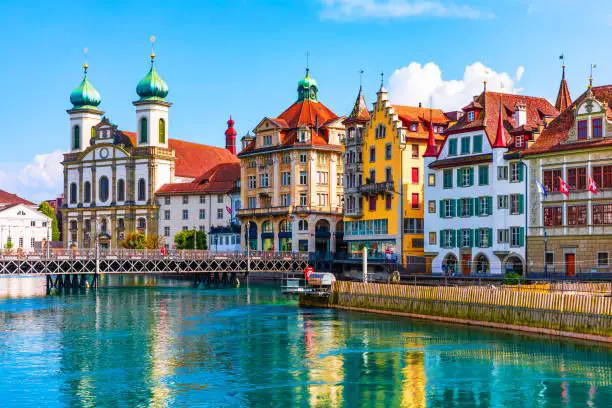
Lucerne is a city located in the heart of Switzerland and is a popular retirement destination for those who love the great outdoors and scenic beauty. Lucerne is surrounded by picturesque mountains and boasts a stunning lake, Lake Lucerne, which offers opportunities for boating, swimming, and fishing.
The city also has a rich cultural heritage, with many historic buildings and museums to explore, including the famous Chapel Bridge and the Water Tower.
In addition to its natural beauty, Lucerne is well-known for its high standard of living, excellent healthcare facilities, and low crime rates. The city is also home to a thriving cultural scene, with a range of festivals, concerts, and events taking place throughout the year.
Overall, Lucerne is an ideal retirement destination for those who are looking for a peaceful, safe, and culturally rich environment in the heart of Switzerland.
The cost of retiring in Switzerland

Retiring in Switzerland can be quite expensive due to the country's high cost of living. However, the amount you'll need to live comfortably will depend on your lifestyle and personal preferences.
Some of the expenses you'll need to consider include housing costs, healthcare, transportation, food, and entertainment. You should also take into account the cost of any necessary travel and visa applications.
In general, you should expect to spend between CHF 2,500 and CHF 6,000 (Swiss Francs) per month to live comfortably in Switzerland. It's important to note that these costs will vary depending on your location, as some areas in Switzerland are more expensive than others.
Healthcare Options For Retirees in Switzerland

The top-notch medical system in Switzerland is a major selling feature for foreigners considering retiring there. All legal Swiss citizens must purchase mandatory Swiss health insurance in order to do this, nevertheless.
When requesting a Swiss residency permit, foreign nationals frequently have to provide evidence of a current accident and health insurance policy. You have three months from the time your residence application is approved to purchase the necessary health and accident insurance before traveling to Switzerland.
You must make regular payments after enrolling in Swiss health insurance. Your yearly deductible is based on your insurance. The retention charge, which represents 10% of the insurer's expenses, is another feature of Swiss health insurance. Each year, the maximum is CHF 700 for adults and CHF 350 for kids. In addition, patients must pay daily hospital fees of about CHF 15.

The price of Swiss health insurance can vary significantly, especially if you choose to purchase supplemental health insurance, which may provide coverage for services that your basic health insurance does not.
In addition to health insurance, all Swiss nationals are required to purchase accident insurance to cover medical costs in the event of an accident, whether related to their employment or not.
Employees often receive coverage through their employer, while those who are not employed must either purchase personal insurance and make a monthly payment, or add it as a supplement to a private insurance plan.
Summary
Switzerland is a popular destination for retirees due to its many advantages, including its stunning landscapes, convenient location, and long-standing reputation for safety and stability.
However, it's also true that living in Switzerland can be expensive, particularly in cities like Zürich and Geneva where the cost of living is among the highest in the world. Retiring in Switzerland requires careful planning and financial preparation, but for those who are able to do so, it can be a truly rewarding experience.
In addition to its natural beauty and safety, Switzerland is known for its excellent healthcare system and strong social safety net, which can provide peace of mind for retirees. The country is also home to a high standard of living, with a rich cultural heritage and a wide range of recreational activities to enjoy.
If you're considering retiring in Switzerland, it's important to carefully research the cost of living in the specific area you're interested in and plan for any necessary expenses, such as health insurance and housing.
It's also important to consider the language barrier and cultural differences, as well as the requirements for obtaining residency. But with proper planning and preparation, retiring in Switzerland can be a fulfilling and enriching experience.
